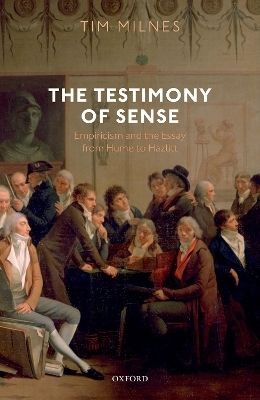
The Testimony of Sense
Oxford University Press (Verlag)
978-0-19-881273-9 (ISBN)
The Testimony of Sense attempts to answer a neglected but important question: what became of epistemology in the late eighteenth century, in the period between Hume's scepticism and Romantic idealism? It finds that two factors in particular reshaped the nature of 'empiricism': the socialisation of experience by Scottish Enlightenment thinkers and the impact upon philosophical discourse of the belletrism of periodical culture. The book aims to correct the still widely-held assumption that Hume effectively silenced epistemological inquiry in Britain for over half a century. Instead, it argues that Hume encouraged the abandonment of subject-centred reason in favour of models of rationality based upon the performance of trusting actions within society. Of particular interest here is the way in which, after Hume, fundamental ideas like the self, truth, and meaning are conceived less in terms of introspection, correspondence, and reference, and more in terms of community, coherence, and communication. By tracing the idea of intersubjectivity through the issues of trust, testimony, virtue and language, the study offers new perspectives on the relationships between philosophy and literature, empiricism and transcendentalism, and Enlightenment and Romanticism. As philosophy grew more conversational, the familiar essay became a powerful metaphor for new forms of communication. The book explores what is epistemologically at stake in the familiar essay genre as it develops through the writings of Joseph Addison, David Hume, Samuel Johnson, Charles Lamb, and William Hazlitt. It also offers readings of philosophical texts, such as Hume's Treatise, Thomas Reid's Inquiry, and Adam Smith's Theory of Moral Sentiments, as literary performances.
Tim Milnes is Senior Lecturer in English Literature at the University of Edinburgh. He previously held posts at University College, Oxford, and Christ Church University College, Canterbury. He has published widely on Romanticism and philosophy, and is the author of The Truth about Romanticism: Pragmatism and Idealism in Keats, Shelley, Coleridge (CUP, 2010), Knowledge and Indifference in English Romantic Prose (CUP, 2003), and William Wordsworth: The Prelude (Palgrave, 2009). His is also the co-editor of Romanticism, Sincerity, and Authenticity (Palgrave, 2010).
Preface
Introduction. Empiricism Made Easy
1: Self and Intersubjectivity
2: The Subject of Trust
3: The Conversable Intellect
4: Essays in Experience
5: Romantic Empiricism
Conclusion
Bibliography
| Erscheinungsdatum | 10.08.2019 |
|---|---|
| Verlagsort | Oxford |
| Sprache | englisch |
| Maße | 159 x 239 mm |
| Gewicht | 584 g |
| Themenwelt | Geschichte ► Allgemeine Geschichte ► Neuzeit (bis 1918) |
| Geisteswissenschaften ► Philosophie ► Geschichte der Philosophie | |
| Geisteswissenschaften ► Philosophie ► Philosophie der Neuzeit | |
| Geisteswissenschaften ► Sprach- / Literaturwissenschaft ► Anglistik / Amerikanistik | |
| Geisteswissenschaften ► Sprach- / Literaturwissenschaft ► Literaturwissenschaft | |
| ISBN-10 | 0-19-881273-6 / 0198812736 |
| ISBN-13 | 978-0-19-881273-9 / 9780198812739 |
| Zustand | Neuware |
| Haben Sie eine Frage zum Produkt? |
aus dem Bereich


